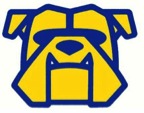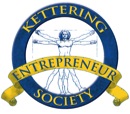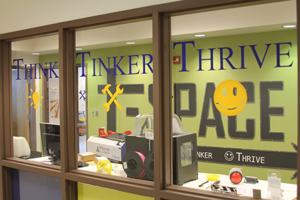School:Kettering University
Contents
- 1 Introduction
- 2 Innovation and Entrepreneurship in the Classroom
- 3 Innovation and Entrepreneurship Related Events
- 4 Kettering Entrepreneur Society
- 5 T-Space
- 6 Co-op Program
- 7 Innovation and Entrepreneurship in the Faculty
- 8 Landscape Canvas
- 9 Entrepreneurial Rating
- 10 2016 Campus Overview
- 11 Related Links
Introduction
Kettering University (formerly General Motors Institute and GMI Engineering and Management Institute) is a university in Flint, Michigan, focusing on STEM (Science, Technology, Engineering, and Mathematics) and Business fields. It offers bachelor's and master's degrees in engineering, math, science, and business. Kettering places a strong emphasis on experiential learning and cooperative education, with undergraduate students required to complete a minimum of seven co-op terms to graduate.[4] The campus is located along the Flint River on property that used to be the main manufacturing location for General Motors. It is named after inventor and former head of research for General Motors Charles Kettering.[5] The school's undergraduate population is approximately 2,000 students.
Innovation and Entrepreneurship in the Classroom
The faculty at Kettering University tends to integrate I&E into the courses through open-ended projects and assignments. The Faculty does not fail to emphasize the importance of I&E in any discipline or major, and they provide students with opportunities to display their I&E skills in the classroom, and to inspire or get inspired.
Programs dedicated to I&E have been proposed in the past, but currently the only dedicated curriculum related to I&E is a minor in entrepreneurship offered by the school's business department. Many forces throughout the school wish to push a more non-traditional approach to I&E, but none have taken hold so far.
Innovation and Entrepreneurship Related Events
Kettering University strives to engage its students with I&E both in and outside the classroom. It currently hosts two campus events that make students delve into I&E.
Innovation Quest
The event is organized weekly and the idea is to compete in an hour long challenge to create a simple machine or device that accomplishes the designated task. The event has gained much popularity around campus and the participation is high. While the event is more geared towards Innovation than Entrepreneurship, the idea is to appeal to the creativity in students.
Kettering Impact
The event is organized once a term and it currently offers a $1000 first price to the student or group of students that can come up with an idea to improve Kettering University and eventually use this to start a venture of their own. The students are made to create a 4 minute long video that entails their idea and the basic need for it along with other important details. The event is usually judged by members of the college administration along with other budding student Entrepreneurs.
Kettering Entrepreneur Society
The three pillars of Kettering Entrepreneurship Society (KES) are Mentoring, Networking and Funding. Students often have great ideas but lack the means to set them in motion. KES seeks to fill in this gap by providing valuable feedback, essential start-up funding, an interactive network, and most important of all, the motivation. KES holds weekly meetings open to the entire student body and faculty. Once a student receives a grant, he/she periodically updates the society on the progress of their projects. Students that are not physically present can also attend meetings virtually using Google Hangouts.
T-Space
The T-Space is Kettering's makerspace, operating with the goal of being a space where students can think, tinker, and thrive. This allows students to grow with their personal and school projects. It currently provides students access to 3D printing, laser cutting, soldering, and other utilities to work on small electric and mechanical projects.
Co-op Program
Arguably, the most attractive aspect of studying at Kettering University is the co-op program. Each term at Kettering University is 11 weeks long, and there are four terms per year. Students alternate between co-op (usually at a company) and school every term, working and studying for a total of 6 months each. Most students graduate with two years of valuable industrial work experience and have a better understanding of the workplace. Also included in Kettering's graduation requirements is a Thesis project, which, while generally being done at a student's co-op, can also be finished through school research or by creating an entrepreneurial venture.
All this practical experience combined offers a much more hands-on approach to I&E. Students learn the basics of managing a project and delivering results along with developing a healthy work ethic.
Innovation and Entrepreneurship in the Faculty
A drive for innovation and entrepreneurship is not only spreading in the student body but it has spread through the administration and faculty with the i2e-au movement. Students actively witness some professors, who are making strides to modify their curriculum to incorporate an I&E mindset, encouraging entrepreneurship within the classroom. Additionally, the university now grants funds to professors who are excelling in this regard in order to further the movement.
Landscape Canvas
Kettering University's Landscape Canvas can be found here.
Entrepreneurial Rating
I would rate Kettering University 6 out of 10 on entrepreneurial activities only because of the huge room it has for growth. Given the vastly technical student population, I&E can play a much broader role in student life at Kettering. The good news is that the college realizes this and is now consciously delegating resources in this arena.
2016 Campus Overview
1. Promoting student innovation and entrepreneurship
- Discover:
- The skills of innovation already exist on our campus because a lot of students work in the real industry, and are exposed to the latest technology for 2 out of 4 years of their undergrad.
- Learn:
- Students can take classes like Software Engineering, Digital Systems, Inen 101,102,201 as well as do an entrepreneurial thesis project.
- Experiment:
- Innovation Quest is where the engineering skills learned in the classroom are applied in a real life design and engineering problem.
- Discover:
- Encouraging faculty innovation and entrepreneurship
- We feel that the best way to get the entire faculty of Kettering to be interested in the I2E will be via the students. Once the students are passionate about innovation and feel the need to fulfill the need in a real world problem - the faculty will have to adapt as they will see the greater value in this cause.
- Actively supporting the university technology transfer function
- University already has the technology function which is sufficient to start this off, however, in the future, as the program grows, new technological advances can easily be made.
- Facilitating University-Industry Collaboration
- Kettering is one of the best schools in the country that is equipped with University-Industry collaboration because every single student that goes is required to work in the industry 6 months out of the year.
- Engaging with regional and local economic development efforts
- Regional and local economic development efforts are made through our school's external affairs office. They provide us with those resources on how to be better engaged in local and regional business.
2. Encouraging faculty innovation and entrepreneurship
- The faculty at Kettering University are very diverse and consist of very distinct backgrounds. With the research we have conducted thus far and the people we have interviewed, it seems that some faculty members are extremely passionate about the innovation and entrepreneurship on campus, while some are very hesitant and do not fully see the point of this program. Kettering is one of the most technical schools in the country, and I think this is where I2E program needs to succeed because students here do have the technical skills to implement big ideas and things. We are planning to encourage the faculty by first encouraging the students as the younger generation is more enthusiastic about the internet and the innovation revolving around technology. The premise is once we have the students supporting the idea of I2E, it will automatically spread throughout the campus, and faculty members will see its value.
3. Actively supporting the university technology transfer function
- The Kettering Entrepreneur Society is one way the university supports the technology transfer of function. To be eligible for a seed grant, members must partake in a three part presentation throughout the term. First off, is a generic idea presentation. This allows the creator(s) to air-out their idea to the society and receive initial advice and criticism regarding said idea. The second step is a line item presentation that gives more background information, and allows the creator(s) to give the society an idea of what line items (e.g. equipment, LLC formation, materials, etc.) to further this innovation. The third step in the process is for the line item financial costs to be presented to the society. The society of members will then vote on the financials during a discussion to see which will be passed or rejected.
- The Kettering Entrepreneur Society offers different tiers of seed grant funding for ideas and start-up companies. Depending on the type of idea, how much “sweat-equity” has been spent on the idea to date, and it’s cost, the Kettering Entrepreneur Society has a flow chart titled “Grant Evaluation” that breaks down what tiers of funding are. The “Proof of Concept Grant” offers students funding for tinkering with ideas and innovation up to $1000. This can include materials for prototyping, professional advice, or capital for initial market research. The “Establishment Phase” is the next tier of funding, which is up to $2500. The creator(s) must demonstrate feasibility with the idea in order to qualify. This phase allows members to form their companies legally, and begin building a minimal viable product. The “Exposure Phase” gives students up to $3500 in funding, but requires feasibility, and a long term vision for the creator(s) business plan. This phase allows students to build on their minimal viable product and hit the ground running with insurance, or other legal barriers that may interrupt their pathway to success. There is also an “In-Between Phases” grant that gives members up to $3000 for those stuck in Establishment and Exposure purgatory. All grants are evaluated by members who share an equal voice. All students on campus are encouraged to partake. If a creator is able to effectively demonstrate a need for a line item and a seed grant is approved by the society, the creator is awarded the seed grant in full for the desired amount.
- The Kettering Tinker Space or T-Space is a maker-space funded for students to develop and tinker with ideas. The T-Space is located in the Mott Science Center on campus, and offers many tinker space amenities. As far as equipment goes, there are various 3D Printers and CNC Machines for prototyping and creation. Plastic filament and acrylic is provided for projects within reason. Students are allowed to bring in outside materials if their project warrants larger than normal quantities. There are also laptops and arduinos/raspberry pi’s available for students interested in learning to program. In addition to programming materials, soldering stations with power tools are also available for those interested in electronics. Resistors and capacitors can be provided once again within reason. There are incubators located inside the T-Space, and members who pitch ideas to KES are eligible for incubator usage. A new addition to the T-Space is the Green room, which has greenscreen wall for cinematography. A movie camera and laptop are located in the room as well as a tripod for unique camera angles. The layout of the T-Space is progressive, and includes foam cubes, whiteboard desks and walls, roller “zero gravity” chairs, and an honor system drink and snack bar. All students on campus are welcomed to use and enjoy the T-Space. For basic members, supervision is required for using any of the equipment. However, after taking a simple safety training course, students are able to use any equipment without supervision. Students can also become T-Space Journeymen, which allows them to train other students and perform equipment maintenance/upkeep. This also gives them 24/7 access to the building as well.
4. Faciliating University-Industry Collaboration
- Kettering University is a unique STEM+B institution, because of the required cooperative education program. Student semesters are broken into four 3-month terms. Each student is required to take two school terms, and two work terms to complete one year at Kettering University. Because of the scheduled co-op plan, students graduate Kettering with two and a half years of professional workplace experience. Kettering’s full-time job placement upon graduation from students fluctuates between 99-100% each year.
- Students co-op cycles can vary, however most students tend to stick with the same company throughout their time at Kettering. Students are treated like full-time employees at work, and are tasked with work accordingly. Due to the cyclical schedule, co-op students are able to bring back information they learned in the classroom and apply it in the workplace.
- Kettering University has a Cooperative Education office that provides students with an individual manager to help them through the co-op process. Co-op managers assist students with resume development, schedule job fairs, and function as the schools liaison throughout the co-op process. They also conduct reviews on companies to determine if students are being deployed adequately and in an engaging way.
5. Engaging with regional and local economic development efforts
- The Kettering Entrepreneur Society encourages students to be involved with regional and local economic development efforts. If a student is interested in participating in any sort of event, KES will sponsor and reimburse students for transportation and registration fees. One event in the surrounding area is Flint SOUP. Flint SOUP is a monthly dinner (soup, salad, bread) that raises seed money for creative projects in the Flint community. They also offer Free Code Camps, free business seminars, and share funding.
- KES also has relations with the University of Michigan Ann Arbor and Lawrence Tech University in sponsoring students for the Makeathon competition. Students compete in a 36 hour competition that requires impromptu engineering design and a solution to a problem they must solve.
Written by:Jace_C._Stokesand Moe Ghias
Related Links
Kettering University
Kettering University Student Priorities
University Innovation Fellows
| UIF Launch Term | Student Name and Bio | Kettering Academic Section |
| Spring 2018 | Julia Rickabaugh | A-Section |
| Spring 2018 | Rebecca Abbott-McCune | A-Section |
| Spring 2018 | Cody Brock | B-Section |
| Spring 2017 | Chelsea Carter | A-Section |
| Spring 2017 | Eric Rickabaugh | A-Section |
| Spring 2017 | Ashley Switalski | B-Section |
| Spring 2017 | Shane Thiede | B-Section |
| Spring 2016 | Moe Ghias | A-Section |
| Spring 2016 | Jace C. Stokes | A-Section |
| Spring 2015 | Cheyne Westerman | A-Section |
| Spring 2015 | Alan Xia | A-Section |
| Spring 2014 | Hunter Casbeer | A-Section |
| Spring 2014 | Saheb Kapoor | A-Section |
Related links



